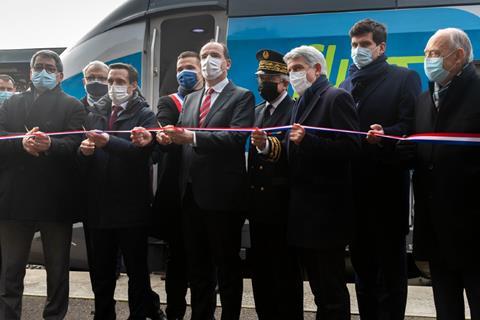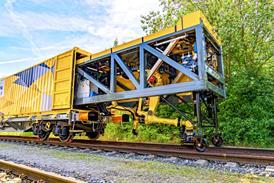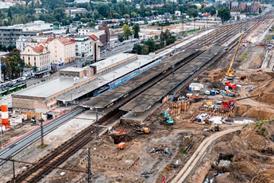
FRANCE: Speaking in Saint-Dié-des-Vosges to mark the reopening of the line to Épinal which had been closed since December 2018, Prime Minister Jean Castex promised the ‘regeneration’ of rural lines right across France.
Describing the reopening on December 12 as ‘a very symbolic moment’, Castex said ‘what we are doing at Saint-Dié-des-Vosges does not make sense unless we do the same everywhere in France. A major movement has begun, with the regeneration of 9 200 km of tracks on minor lines. This is a question of ecological transition, but there is also an economic logic and the defence of rural life.’ Renovation of SNCF’s rural network over the next 10 years is expected to cost up to €7bn.
Referring to plans for the launch of hydrogen-powered trains in 2023, Castex asserted that rail was a ‘high technology’ industry. ‘Rail is an investment in the future, and there will be a return on that investment’, he anticipated. Castex later boarded a train to Épinal along with Transport Minister Jean-Baptiste Djebbari.
During the three-year closure of the 49 km line renovation work costing €21m has been carried out, including nearly 8 km of relaid track, renewal of rails and ballast on other sections, upgrades to six level crossings and structural work on the Vanémont tunnel as well as repairs to the tunnel at Bruyères. In a formula intended to apply to other reopening projects, the state has funded 40% of the cost with the rest being borne by the Grand Est région.
On a typical weekday there are now 10 daily TER services in each direction between Épinal and Saint-Dié-des-Vosges, seven of which continue to and from Strasbourg. These call at Bruyères and Arches and offer journey times of 51 to 56 min.
A concession to operate services on the route is to be tendered in 2023, along with three other routes.
Meanwhile, in Occitanie, Regional President Carole Delga said passenger services would be restored along the line serving the right bank of the Rhône in the département of Gard by the summer of next year; this follows a regional campaign to restore services earlier than planned in 2024. Trains would initially run between Nîmes and Pont-Saint-Esprit via Avignon.
Regular passenger services last ran on the route in 1973, since when the line has been used exclusively by freight and diverted long-distance passenger trains. Eight stations are being renovated, with footbridges or subways installed, while 27 level crossings will be improved. A turnback track is to be built at Pont-Saint-Esprit. The plans envisage a service of eight trains each way per day.
Renovation work is also to start next year on the 35 km Montréjeau – Louchon line in Haute-Garonne, serving the ski resort at Luchon. This route is expected to reopen by the summer of 2023, and the line is envisaged as a potential testbed for the hydrogen fuel cell Régiolis being developed by Alstom for SNCF and a group of regions including Occitanie.
The region has also shortlisted two other routes for potential reopening: the 32 km Alès – Bessèges branch is intended to improve access to the Cevennes national park whilst the 44 km Rodez – Sévérac line has been closed since December 2017.

















